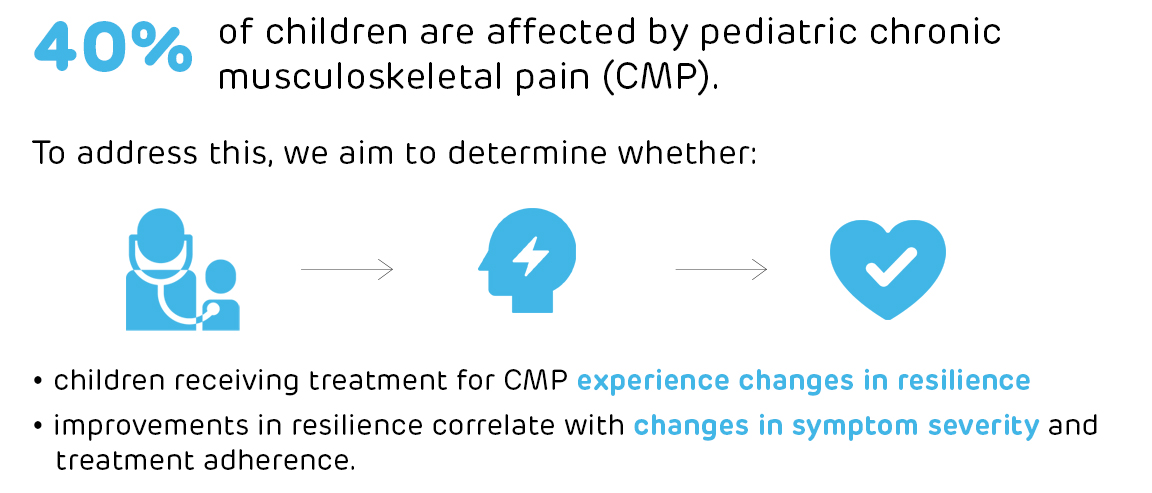Fostering Resilience in Adolescents with Chronic Musculoskeletal Pain
Statement of Problem
Pediatric chronic musculoskeletal pain (CMP)—chronic pain affecting the bones, joints, muscles or connective tissues for three months or longer—is extremely prevalent, affecting up to 40% of children, primarily adolescents. Despite current treatment practices, long-term outcomes for youth with CMP remain poor, with affected teens experiencing greater anxiety, depression, and overutilization of health care and a greater risk of opioid misuse as adults. While cognitive behavioral therapy (CBT) can effectively treat adolescent CMP, access to a psychologist can be challenging for some families, and CBT alone does not result in improved physical activity among affected teens.
Resilience-training interventions serve as potential alternative psychosocial skills-based interventions for the treatment of adolescent CMP. While routed in traditional CBT, resilience-training interventions are distinct in that they are brief and target specific stress management skills. More youth can access these interventions since providers, including bachelors-level, non-clinical personnel, can deliver them remotely via telephone or telehealth.
Our long-term goal is to test the efficacy of a resilience-training intervention (Promoting Resilience in Stress Management [PRISM])—which researchers in the Palliative Care and Resilience Research Program at Seattle Children’s Hospital originally designed for adolescents and young adults with serious illness—among a population of youth with CMP. However, prior to doing so, we need more research to understand the role of patient and parental resilience in disease management among youth with CMP.
Description
Fostering Resilience in Adolescents with Chronic Musculoskeletal Pain
Fostering Resilience in Adolescents with Chronic Musculoskeletal Pain


Findings from this study will support future studies evaluating the efficacy of resilience training interventions for adolescents with chronic musculoskeletal pain.
Our prior research demonstrates low resilience among youth ages 12-17 with CMP, as well as a link between resilience and measures of disease burden (i.e. pain level and widespreadness of pain). In a single-arm pilot trial of PRISM, we demonstrated excellent feasibility and acceptability of the resilience coaching program among youth with CMP. We enrolled 69% of youth approached over a 6-month period (surpassing target enrollment rate of 25%); total n=27. Eighty-five percent of youth completed all required study visits. Video visit (71%) was the most frequent visit type. Mean participant satisfaction (rated 1=very unsatisfied and 5=very satisfied) was 4.27 (SD 0.94). Exploratory analyses suggested improvements in resilience and clinically relevant outcomes. Qualitative feedback was universally positive and supported our hypothesis that PRISM provides an alternative and acceptable psychosocial intervention for youth unable to access mental health services or perceive a stigma with it.
We also have an ongoing research project, longitudinally assessing resilience and other psychosocial risk factors among youth with CMP at time of initial clinic visit and again approximately 6 months later for adolescents diagnosed with CMP and one of their parents.
Patients and proxies will complete the Connor Davidson Resilience Scale 10-item (CD-RISC-10) and patient-reported outcome measures to assess resilience and treatment adherence. We will link our findings to information from the electronic medical record. We will also assess whether changes in resilience, and other psychosocial risk factors (i.e. pain catastrophizing, mindfulness, optimism, etc.), are associated with a number of symptoms and factors important to patients with CMP including pain intensity, physical disability, health-related quality of life, symptom severity, widespreadness of pain and parental resilience.
Findings from this study will complement the execution of K23-funded pilot randomized controlled trial of PRISM among adolescents with CMP that will 1) evaluate the efficacy of PRISM-C, 2) explore for which patients PRISM is most beneficial, and 3) examine implementation outcomes and identify barrier and facilitators to engagement to inform future implementation efforts. Youth will be randomized to usual care alone or usual care plus PRISM. The team will administer the intervention via telehealth. The team will also interview subjects upon completion to gain additional feedback to help reformat the intervention as needed.
The goal of this body of research is to contribute unique knowledge regarding risk factors associated with long term outcomes in adolescent CMP and identify ways to support adolescents with CMP.
Next Steps
Understanding how resilience relates to symptom severity and treatment adherence among youth with CMP as well as further determining the efficacy and applicability of PRISM in clinical care for youth with CMP will help ensure successful treatment outcomes for this vulnerable patient population. Long-term, we hope this research will result in improved access to and efficacy of non-pharmacologic psychosocial interventions for adolescent CMP.
In our Research in Motion video series, Dr. Sabrina Gmuca explains more about her work in fostering resilience in youth with chronic, including her aims to utilize PRISM to help reduce suicidal thoughts among these youth.
This project page was last updated in May 2023.
Suggested Citation
Children's Hospital of Philadelphia, PolicyLab. Fostering Resilience in Adolescents with Chronic Musculoskeletal Pain [online]. Available at: http://www.policylab.chop.edu. [Accessed: plug in date accessed here].
